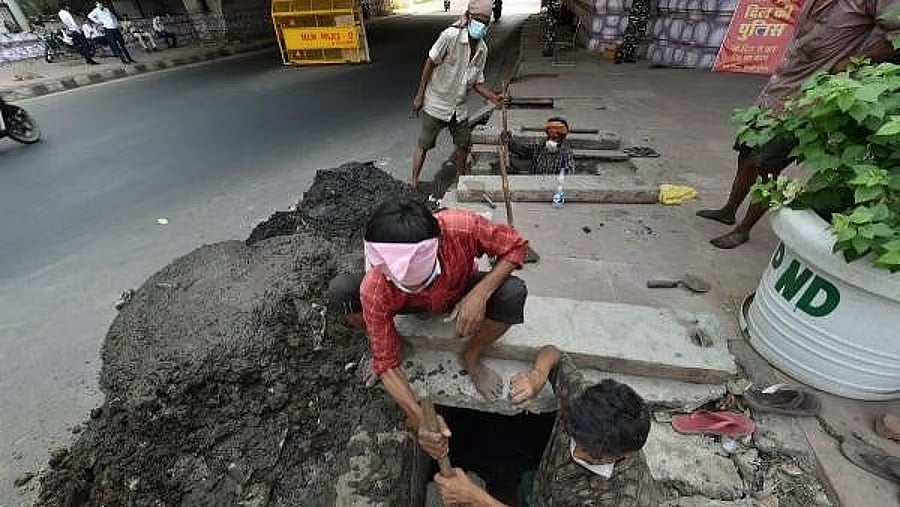
Representative image of sanitation workers
Credit: PTI File Photo
New Delhi: Union Ministry of Housing and Urban Affairs has released new guidelines to prevent unsafe sanitary practices and encourage urban local bodies to adopt mechanised cleaning.
The Swachh Bharat Mission-Urban (SBM-U), under the aegis of the MoHUA, has issued model empanelment and contract documents to guide Urban Local Bodies (ULBs) in engaging Private Sanitation Service Operators (PSSOs).
This framework aims to establish clear legal and operational guidelines for delivering safe, mechanised services in compliance with the Prohibition of Employment as Manual Scavengers and their Rehabilitation (PEMSR) Act, 2013.
These model documents ensure citizens receive professional sewer and septic tank cleaning services while holding PSSOs accountable for mechanization and safety regulations, a statement from the Ministry said.
The empanelment document lays down the procedure to encourage private entities involved in sewer and septic tank cleaning services to register with cities.
These private entities could include companies, cooperative societies, self-help groups (SHGs) and Micro-entrepreneurs. The cities are encouraged to promote and register SHGs, and Micro-entrepreneurs that are beneficiaries of welfare schemes by the National Safai Karamcharis Development Corporation (NSKFDC), said the statement.
The maintenance of sewer networks and desludging of septic tanks is essential for cities to ensure safe collection, disposal and treatment of used water. However, these maintenance activities often involve cleaning of sewers and septic tanks through the manholes with adequate safety and protection measures to be followed by the sanitation workers.
In absence of strict oversight and adherence to the safety protocols, sanitation workers often undertake hazardous cleaning of sewers and septic tanks manually. This has led to numerous accidents and tragic fatalities across the country.
The contract also defines the roles and responsibilities of city and private operator, service level benchmarks, and cost of services to citizens. It further sets the terms for penalties, termination and blacklisting of private operators that violate the safety protocols causing risks to the health and safety of sanitation workers and failing to perform mechanized cleaning services under this contract.
The model contract documents issued by MoHUA are envisaged to nudge cities and PSSOs to adopt mechanized cleaning of sewer and septic tanks and further strengthen the National Action for Mechanized Sanitation Ecosystem (NAMASTE).
Out of an estimated 42 crore urban population in India, about 50% (4.5 crore households) use septic tanks. This indicates a critical need for regular desludging services to safely remove and dispose of faecal sludge at designated treatment locations.
Around 35 per cent of the population is connected to sewer networks that require regular maintenance for efficient wastewater flow to treatment plants.
Both sewer systems and septic tanks need regular cleaning - sewer manholes must be cleared of blockages, and septic tanks must be desludged every three years to remove built-up faecal waste, the statement said.
